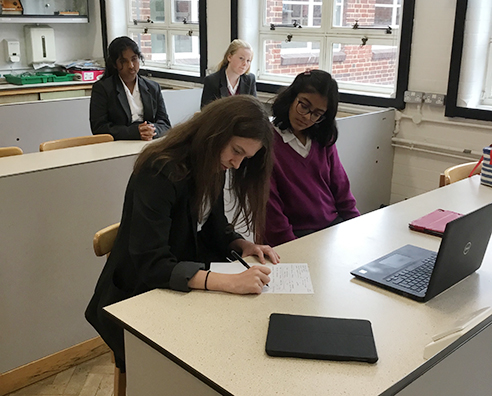
Dr Swope (Physics Teacher)
We are delighted that BGS was selected to be among fifty schools across the UK to be part of the Tomorrow’s Engineers COP Summit. This summit is a school version of the COP summit amongst countries that is being hosted in Glasgow in November. It was hosted on Zoom and took place during lunch time on Wednesday. The participants were organised into four break-out rooms to discuss ways that we could prepare ourselves better to tackle climate change.
We selected two BGS students to participate in the summit, Poppy Phillips (Year 11) and Hania Tauqeer (Year 8). We also had two BGS students observing the summit, Kabinaya Kiritharan (Year 7) and Isabelle Harnan (Year 8). Here are their statements:
Poppy Phillips (Year 11)
“One day I aspire to work in motorsport engineering and hope to study Automotive Engineering. As cars contribute towards 18% of the UK’s global greenhouse gas production - it’s an area that is predicted to change the most. The government has already announced that all combustion engine-run cars will stop production and switch electric by 2030 and many people are making the change already.
“Developments are starting to be made by Formula 1 engineers into electric cars and 100% recycled eco fuels. I am incredibly excited and interested by these changes that the sport is beginning to make, especially as the technology being produced now I will hopefully be working with in my later life. I would love to attend this summit as it will be fascinating to find out more about how engineering can be used to aid net zero. I would also love the opportunity to share my research and ideas for how motorsport can become/is becoming more eco-friendly. Additionally, I am a member of the school's Model UN debate team so have experience preparing for and talking in events like this.”
Isabelle Harnan (Year 8)
“In our area, I think that it would be a good idea to reduce carbon emissions by using artificial trees. Klaus Lackner came up with this design which can take in carbon dioxide using fake leaves that are actually 1,000 times more efficient than natural ones. Lackner then followed up by saying that the C02 that was captured could also be used in fuels. Overall, if we invest in these pieces of technology then although it may not solve national problems, it will be the first step to overcome them.”
Hania Tauqeer (Year 8)
“I wanted to attend the summit since I have lots of ideas on how to reduce greenhouse gas emissions. I believe it is a great opportunity to learn more about engineering and how it impacts the world we live in. If I get a spot, I will participate to the best of my ability and I really want to attend. The summit was a wonderful opportunity to learn more about engineering and climate change. I enjoyed participating and would definitely do it again if given the chance. We also got to summarise our groups discussion to the rest of the conference which I enjoyed doing.”
Kabinaya Kiritharan (Year 7)
“I can tackle climate change in my future career by being an architectural engineer so I can build houses that are solar powered or have renewable energy sources or I could weatherize a house by building insulation in it to keep the cold out during winter time. Or if I find being an architect is not my future career, I could be an electronic engineer by building washing machines/dishwashers that reduce the amount of water but still cleans thoroughly. I could also design a car that uses less fuel so there are not as many petrol shipments overseas, as this can cause a lot of oil spills. These cars would also be affordable since they are going to make a positive change to the world.”





















